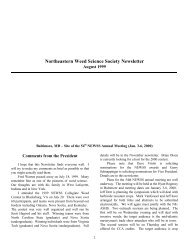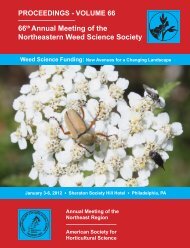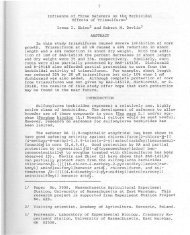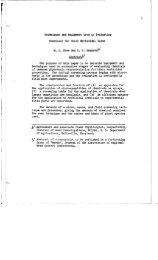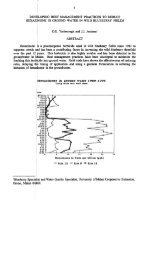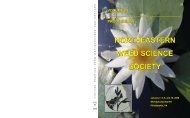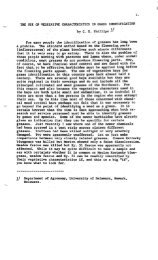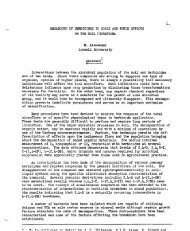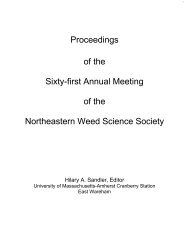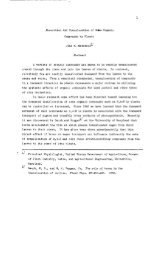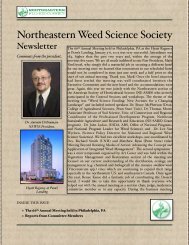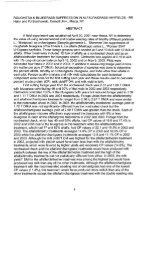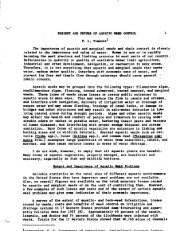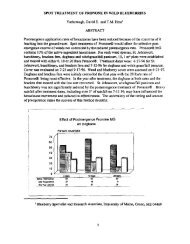Vol. 54â2000 - NorthEastern Weed Science Society
Vol. 54â2000 - NorthEastern Weed Science Society
Vol. 54â2000 - NorthEastern Weed Science Society
You also want an ePaper? Increase the reach of your titles
YUMPU automatically turns print PDFs into web optimized ePapers that Google loves.
ROUNDUP-READY<br />
CORN: TIlE MAINE EXPERIENCE<br />
J.M. Jemison, Jr.'<br />
ABSTRACT<br />
GeneticEngineering(GE)hasbeen hailedas theanswerfora cleanerenvironment,a<br />
continuousandabundantfood supply,anda meansto respondquicklyto specific needed<br />
changesin cropvarieties. It hasalsobeencondemnedas anunpredictablescience,the<br />
beginningof theendof agriculturalgeneticdiversity,a potentialcreatorof superweeds,<br />
andanecologicalmenacethatwill destroynaturalsystemson whichhumanlife depends.<br />
Concern over genetically engineered (GE) food is growing in both Europe and in the<br />
United States. Groups of highly vocal, militant activists are trying to capture the<br />
attentionof theAmericanpublicwhohadapparentlyacceptedGEas a generallypositive<br />
direction for U.S. agriculture. This highly political and strongly polarized issue bas<br />
piquedthe interestof the news mediawithNewsweek recentlypublishingan articleon<br />
"Frankenfoods"andwireservicescarryinginformationaboutattackson researchplots<br />
acrossthecountry.Theinternethaschangedthespeedwithwhichinformationtravels<br />
andpotentialaccuracyof information.Theneedforthe Universityto be able to provide<br />
credibleinformation to thishighlycomplicatedissuecontinuesto grow.<br />
This summer,a researchstudywasvandalizedattheUniversityof Maine. Theaction<br />
raiseda numberof importantissues:I) howdowe avoidloss of valuableinformation<br />
whilemaintainingpublicaccessto research;2) how extensivewill the futuredestruction<br />
be; 3) bow to increase public input and understanding of our applied researcb programs;<br />
and 4) bow to prepare educators to be versed on all aspects of the GE issue and in risk<br />
communicationin orderto becrediblesourcesof information.<br />
In thepresentation,I will discussmyviews regardingeachof thesepoints. Publicaccess<br />
to researchis criticalto agriculturaladvancement.Wemustdetermineways to allow<br />
publicaccesswithoutcompromisingourabilityto collectneededdata. In ourstudy,the<br />
vandalsonlydestroyedthecrops. Theviolenceanddestructionin othereventshas<br />
intensified; but, bow far will this go? Concern over public funds being used to further<br />
industry,andcredibilityof information generatedis underindictment.Forexample.in<br />
ourlocaleditorials.I was accusedof beinga "shillforMonsanto"becauseI was given a<br />
free bag of seed com for the study. I received no additional funding from Monsanto to do<br />
this work, yet that was the most frequently asked question of me by the media. Lastly,<br />
we mustcompletelyunderstandall aspectsof thematerialswe areusing. Itdoesn't<br />
matterthatwe mayhaveno fonnaltrainingin molecularbiology,GEcriticsexpectus to<br />
knoweverythingaboutthemodifiedcropswe aregrowingincludingwhichmarkergenes<br />
are in specific plants, distance pollen can travel, and many other details. We need to be<br />
trainedin riskcommunicationin orderto beseenas credibleSOlU'Ces of information.<br />
IAssociateExtensionProfessor- Universityof Maine CooperativeExtension<br />
52



